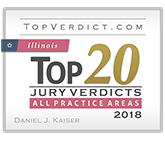Can I Receive Workers’ Compensation if I Became Sick While Working?
 There are many ways a person can be injured while they are on the job. When workplace accidents occur, or when a person experiences physical health issues due to the work they have performed, they will typically be eligible to receive workers’ compensation. But what about situations where a person becomes ill due to conditions in their workplace or exposure to an infectious disease? In these cases, workers will need to understand how workers’ comp addresses occupational diseases.
There are many ways a person can be injured while they are on the job. When workplace accidents occur, or when a person experiences physical health issues due to the work they have performed, they will typically be eligible to receive workers’ compensation. But what about situations where a person becomes ill due to conditions in their workplace or exposure to an infectious disease? In these cases, workers will need to understand how workers’ comp addresses occupational diseases.
Benefits Available to People Who Experience Occupational Illnesses
Work-related health issues are a common concern for people in certain occupations. Workers who are exposed to substances that could cause them to suffer illnesses, such as construction or demolition workers who work around asbestos, will want to make sure the proper measures are taken to ensure their safety. Since the onset of the COVID-19 pandemic, this has become a significant concern for many people. Employees who work around the general public can be exposed to Covid, which may not only require them to take time off work while they are contagious but may also have long-term effects on their health.
Fortunately, workers’ compensation treats occupational diseases the same as other injuries that occur while a person is working. If a person can demonstrate that they contracted an illness due to exposure to certain substances or germs in the workplace, or if they can show that a disease arose out of the work they performed, they will be able to receive workers’ comp benefits.
Workers’ compensation will cover the costs of all medical treatment related to an occupational disease. This may include doctor visits to diagnose an illness, hospital stays for those who suffer from serious conditions, and ongoing treatment or medications. Disability benefits will also be available if an illness causes a person to be unable to work or results in a reduction in income. If a person misses at least three days of work, they may begin receiving temporary disability benefits, which will pay two-thirds of the income they earned prior to becoming ill. Temporary partial disability benefits may also address situations where a person is only able to work at a reduced capacity while they are recovering from an illness; in this case, someone may receive two-thirds of the difference between their wages prior to becoming ill and the amount they are currently able to earn.
Permanent disability benefits may be available if an illness results in ongoing health issues that affect a person’s ability to work (for example, when a person contracts a respiratory illness due to the inhalation of toxic chemicals in the workplace and this permanently affects their stamina and their ability to perform manual labor). In these situations, a person may receive permanent partial disability benefits that will address the differential between the amount they previously earned and the wages they are currently receiving, or benefits may be paid for the percentage of loss of function the person has experienced. If an illness is serious enough to completely prevent a person from working, permanent total disability benefits may be paid for the rest of the person’s life.
Contact Our Elk Grove Village Occupational Disease Attorneys
Workers who experience health issues from exposure to infectious diseases or toxic substances, or who suffer from other illnesses related to work they have performed, deserve to receive proper medical and disability benefits. Kaiser Law provides legal help and representation in these situations, and we can assist with the filing of workers’ comp claims or appeals. Contact our Elmhurst workers’ compensation lawyers at 630-274-4400 for a free consultation.
Sources:
https://www2.illinois.gov/sites/iwcc/Documents/handbook.pdf
https://www.ilga.gov/legislation/ilcs/ilcs3.asp?ActID=2430&ChapterID=68

 630-274-4400
630-274-4400












